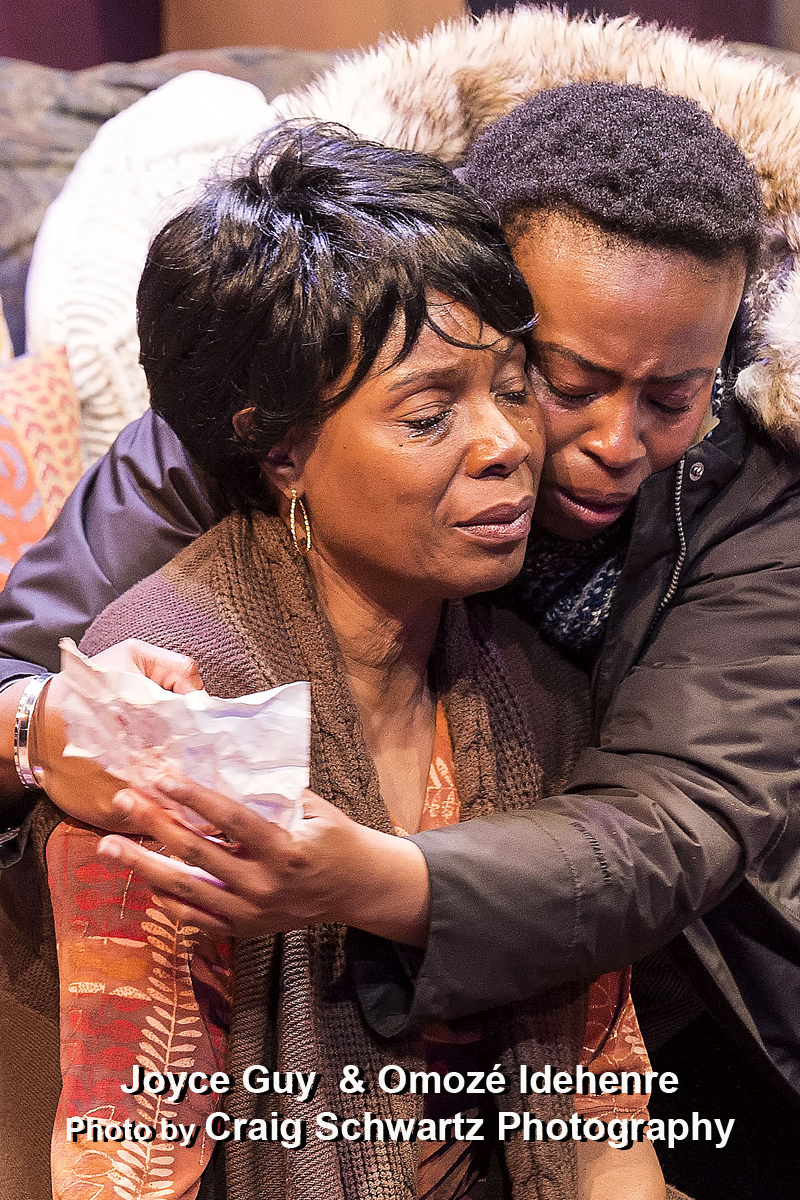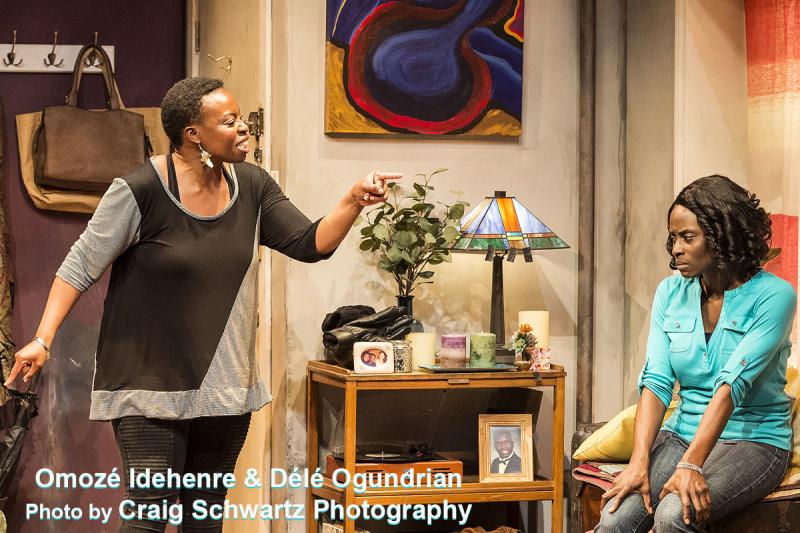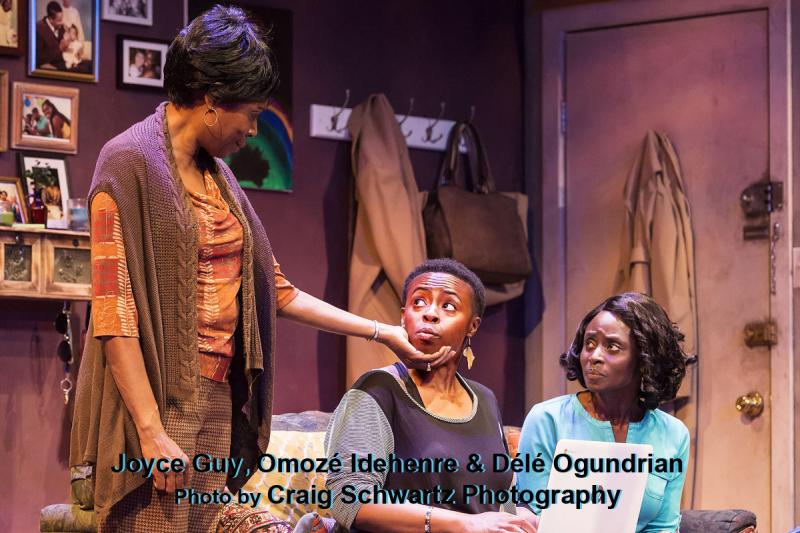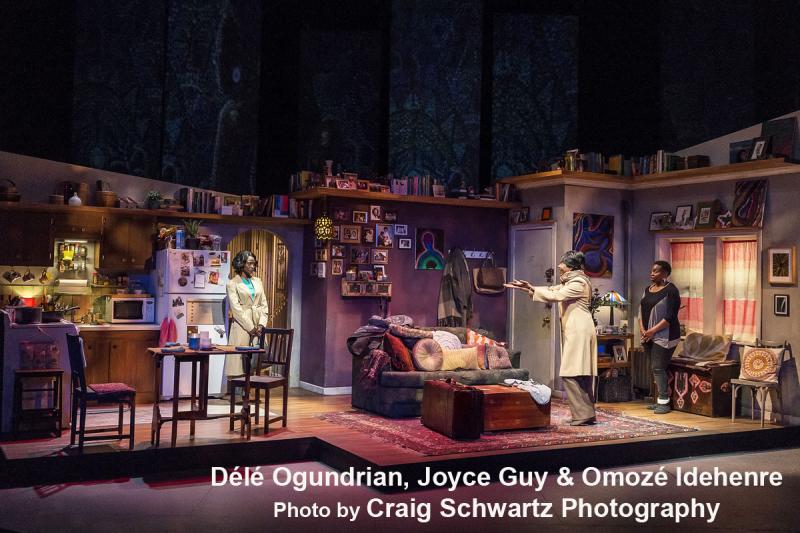Review: HER PORTMANTEAU - Inexplicably Serious Baggage to Carry

HER PORTMANTEAU/by Mfoniso Udofia/directed by Gregg T. Daniel/Boston Court Pasadena/thru June 30, 2018
The west coast premiere of playwright Mfoniso Udofia's HER PORTMANTEAU receives a most reverential mounting at Boston Court Pasadena. Udofia's story of the re-uniting of two half-sisters from places across the Atlantic Ocean starts off with a confused Iniabasi just arriving at JFK from Nigeria. Seeing no one to meet her, Iniabasi finds a payphone and makes a couple of phone calls, all in her native tongue. All that's communicated from this scene, if you don't understand the language, would be Iniabasi's feelings of futility and frustration with her present plight. The eventual arrival of her ecstatically welcoming half-sister Adiaha has no affect on Iniabasi's disagreeable mood. Adiaha drives the non-responsive Iniabasi to her fifth-story apartment, Adiaha's calm place. Their mother Abasiama, who was supposed to pick Iniabasi up from JFK, finally arrives, and the palpable discomfort rises.
 Abasiama and Iniabasi argue in their native Nigerian language leaving Adiaha (and the non-Nigerian language-speaking theatre audience in the dark). Actually, Adiaha understands the language, and Iniabasi can speak English.
Abasiama and Iniabasi argue in their native Nigerian language leaving Adiaha (and the non-Nigerian language-speaking theatre audience in the dark). Actually, Adiaha understands the language, and Iniabasi can speak English.
Gregg T. Daniel directs HER PORTMANTEAU at a deliberate, thoughtful pacing allowing much time for the audience to figure out the puzzling set-ups that just occurred.
Omozé Idehenre energetically supplies the needed jolt of energy and enthusiasm as Adiaha, Abasiama's loving daughter with the desire to please her mother's every whim. Idehenre injects the fresh breeze of realism with the right amount of sass into the staid proceedings. All sympathies soar to Idehenre's charming Adiaha as she unsuccessfully attempts to win over the petulant, angry Iniabasi.
 Joyce Guy grounds HER PORTMANTEAU as Abasiama, the maternal loving heart of this piece. Guy effortlessly exposes the inner conflicts her character keeps undisclosed. Abasiama's always thinking, always excusing, always planning, and Guy's always giving the audience insight to Abasiama's inner turmoil. Very nice!
Joyce Guy grounds HER PORTMANTEAU as Abasiama, the maternal loving heart of this piece. Guy effortlessly exposes the inner conflicts her character keeps undisclosed. Abasiama's always thinking, always excusing, always planning, and Guy's always giving the audience insight to Abasiama's inner turmoil. Very nice!
Délé Ogundrian essays Iniabasi, the most challenging role of HER PORTMANTEAU as her character begins as off-putting, especially against the over-hospitable gestures of her affable half-sister. She then breaks her silence and rants as an entitled brat - rather unsympathetic. Reasons for Iniabasi's questionable behavior's not revealed until late in the one-act.
Kudos to scenic designer Tesshi Nakagawa and properties designer Erin Walley for Adiah's New York apartment set, very lived-in with tons of tchotchkes, candles, and pillows.
 Projection designer Nick Santiago's cityscapes and generic portraits projecting behind and above the apartment set, though visually pleasing, seem disconnected to what was going on onstage. In another moment of puzzlement has Abasiama looking through an assortment of photographs. Santiago's projected portraits have no semblance to the photographs Abasiama's describing.
Projection designer Nick Santiago's cityscapes and generic portraits projecting behind and above the apartment set, though visually pleasing, seem disconnected to what was going on onstage. In another moment of puzzlement has Abasiama looking through an assortment of photographs. Santiago's projected portraits have no semblance to the photographs Abasiama's describing.
The difficulty of having characters converse in an language that most of the theatre audience is not familiar with, might have been circumvented by having Adiaha, the American-raised daughter, much less fluent in the Nigerian language Abasiama and Iniabasi speak. Then, the well-meaning mother would have to translate everything for Adiaha, and, inadvertently, the audience.
This significant situation of bringing a half-sister over from Nigeria to the United States certainly involves and needs to be told. Though deeply moving, too many questions left unanswered at curtain call.
Reader Reviews
Videos

